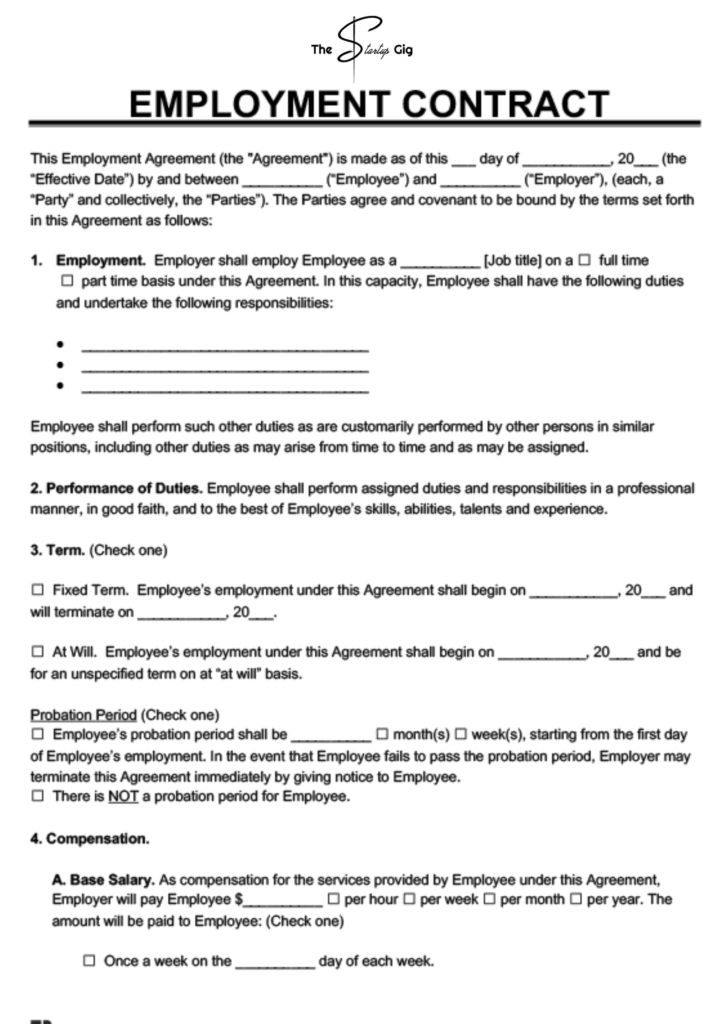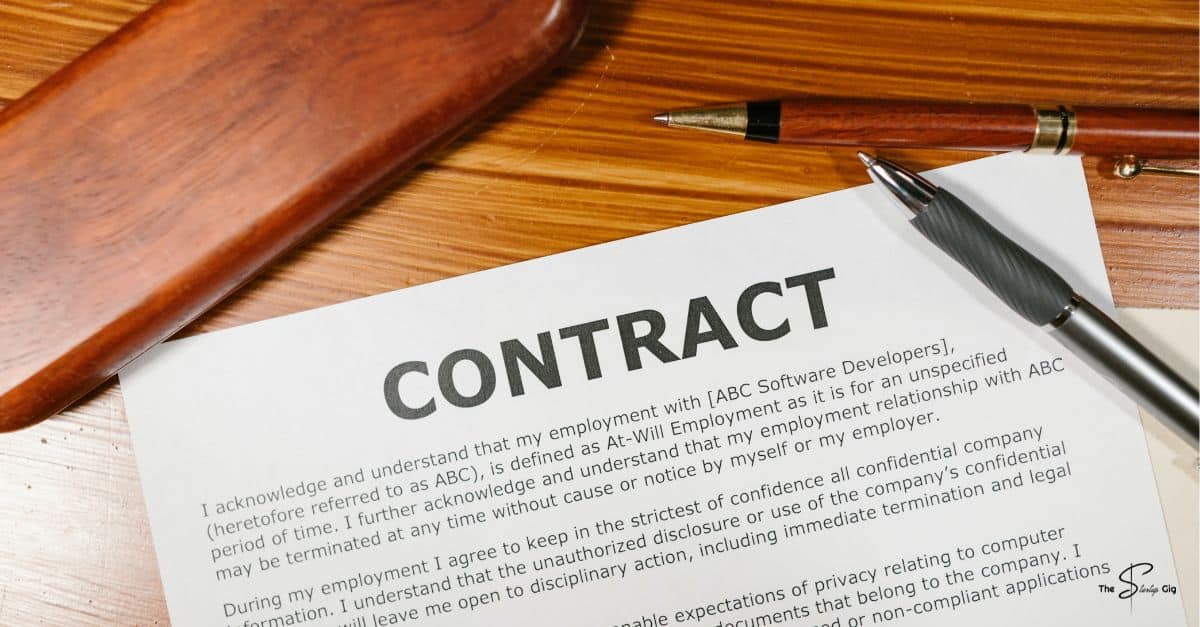What is an Employee Contract So this blog will help the employer, which can be a startup or any company, and also any person willing to join the startup or company, as an employee, to know the intention and meaning behind the clauses of an employment agreement. This will help the parties to an employment agreement to play a more proactive role while negotiating the terms and conditions of an employment agreement. This will ultimately benefit both parties.
In this blog, we will try to cover the clauses that form part of an employment agreement. Having basic knowledge about the clauses of an employment agreement is important for both the employer and employee before negotiating and signing such an agreement. So let’s look at the clauses of an employment agreement.
DOWNLOAD Free Employee Contract Template
List of Clauses in an employment agreement
Here is the list of clauses in an employee contract:
Parties to the contract
It specifies the name of the parties to the contract. It contains the name and address of the person to be employed and the details of the employer’s organization as well.
Appointment
It mentions the date of commencement of the work or the starting date of employment.
Job description
This clause provides complete details about the job, the title or position held, describes the essentials and demands of such a job, and responsibilities of the employee while performing the job. It also mentions in which department as well as under whose supervision the employee will work.
Place of work
This clause specifies the details about the workplace at which the employee has to report and start working. Further, this clause should also provide any details about chances of a change of workplace in future.
Probationary period
A probationary period or a trial period is a period in which the employer keeps a watch over a fresh employee or a current employee who has acquired a new position. This period is for the assessment of the performance of the employee based upon which his suitability and eligibility for the desired job are decided by the employer. This clause should mention the duration of time of such probationary period. Such a probationary period can also be extended. Basic remuneration is paid to the employee during the probationary period.
Work hours
This clause provides details about the number of hours the employee is expected to work daily i.e the regular working hours. It also provides details about whether he has to work in day shift or night shift or has to work remotely. The work hours should be in consonance with the various labor laws in India.
Holidays/leaves/vacations
This clause specifies the details about the holidays or leaves and the vacation period that the employee is entitled to during the course of his employment. It provides the details about the number of holidays enjoyed by the employee including or excluding public holidays annually. It also includes leaves like casual leaves, medical or sick leaves, special leaves, privileges, or earns leaves. It also provides for the procedure to be adopted when such leaves or holidays or vacations are not utilized and in cases of termination, whether he can carry forward them in the next year or he has to be provided compensation or payment for such unutilized leaves.
Salary/remuneration/payment
This clause provides the details of the salary or remuneration amount or consideration paid by the employer to the employee for a specified period. It should specify the monthly or gross salary, after appropriate deductions like income tax, PF, and medical insurance, to be paid to the employee. It is also inclusive of incentives like bonuses, overtime pay, holiday pay, etc. Further, the method of payment like mode of payment and date of payment is also specified in such clauses.
Reimbursement of expenses or other expenses:
This clause provides details about the expenses which an employee might have to bear or incur while performing or discharging his daily or routine duties or work. Sometimes an employee might also have to spend money out of his own pocket. These expenses include house rent allowance, travel or vehicle allowance, petrol allowance, mobile phone recharges, office stationery, etc. An employer is liable to pay such expenses. It should specify which expenses will be reimbursed, and the time period for such reimbursement.
Confidentiality
This clause provides that the employee should not disclose any confidential information or trade and business secrets about the organization in which he is working to any third party without prior permission from the employer. Such a clause can be part of the employment agreement or there can be separate execution of confidential or non-disclosure Employee Contract. This clause can also survive after the termination of an Employee Contract for a certain period to prevent the leak of any vital information.
Non-compete for clause and non–solicit clause
This clause restricts an employee from competing with the employer or working under a competitor during the period of employment and even after the termination of employment for a specified period. This can be a separate non-compete agreement or be a part of the employment agreement itself. Further, an employee after the termination of his employment is not allowed to provide or solicit advice to the clients of the former organization where he worked. It also provides that he should not lure any of his former employee colleagues for resigning from the job and joining him.
Termination
This clause provides for the circumstances which can lead to the termination of employment or service of an employee. This can be by will, retirement, non-performance, misconduct, breach of the employment agreement, layoff, etc. It provides for the causes, procedure for termination, notice period, compensation, indemnity, penalty, etc. Termination should not take place without any justified reason.
Dispute resolution
This clause provides for the procedure to be adopted while resolving any disputes arising out of employment between the employee and employer or management. It specifies how such disputes might be settled. Disputes can be settled either by going to the civil courts or by opting for a peaceful and less time-consuming method of dispute resolution like arbitration.
Jurisdiction and governing laws
This clause provides details about the judicial court or dispute resolution forum under whose jurisdiction or who will have the authority to resolve any legal disputes between the employee and employer or management. It can be a labor court or arbitration tribunal or independent arbitrator. It also provides for the laws which will govern such disputes.
Conclusion:
So this blog will help readers, entrepreneurs, and startups to know the importance of properly negotiating and drafting an employment agreement or Employee Contract. Hence it is important to consult a lawyer and more specifically a lawyer who has expertise in dealing with startup procedures i.e. a startup lawyer. A startup lawyer can help you in drafting a watertight employment agreement for startups. Further, he can ensure that all the required legal compliances with respect to startups have been adhered to.
Such a startup lawyer can not only help you in drafting and vetting legal documents(contracts and agreements) but he can also be helpful in various stages like getting investors in your startups, startup finances, getting angel investors or angel investment companies providing angel capital or angel money, crowdfunding or other funding opportunities for startups. So if you are an entrepreneur with a startup plan, or an angel investor or funding investor looking to invest, then seeking the consultation of a Startup Lawyer who has all-around knowledge with respect to startups, is a must.
For any other queries regarding Startups or company law and services visit The Startup gig
Sample of Employee Contract Template






